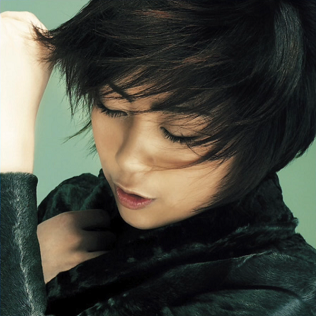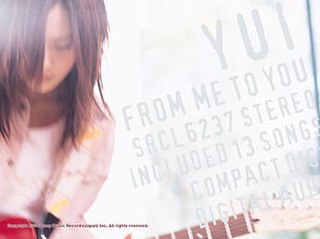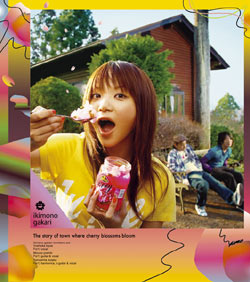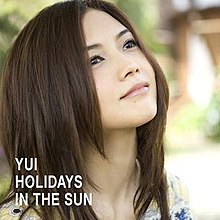
Namie Amuro is a retired Japanese singer. She rose to prominence as a teen idol, and transitioned into a leading pop artist due to her versatility across music styles and visual presentation. Due to her career reinventions and longevity, she is known as an icon across Japan and Asia. She has been referred to as the "Queen of Japanese Pop", and her influence domestically has drawn equivalent comparisons to artists such as Janet Jackson and Madonna in Western pop culture.

Distance is the third studio album by Japanese singer Hikaru Utada. Toshiba EMI released it on March 28, 2001, making it her second release with the label. Utada wrote and co-produced the majority of the album, alongside previous collaborators Akira Miyake and her father Teruzane Utada, as well as new collaborations with American producers Rodney Jerkins and Jimmy Jam & Terry Lewis. Distance, like its predecessor First Love (1999), is influenced by pop music and R&B, with additional hip-hop, rock, reggae, and techno influences from Western music.

Deep River is the fourth studio album by Japanese-American singer Hikaru Utada. It was released via Toshiba EMI on June 19, 2002. The title of the album, as well as its title track, was inspired by the novel Deep River by Shusaku Endo. Utada wrote and co-produced the majority of the record, and unlike her previous album Distance (2001), she worked primarily with Japanese collaborator Akira Miyake and her father Teruzane Utada. Musically, Deep River is widely noted by fans and critics as the transition state from Utada's earlier style, R&B, to ethereal pop.

I Am... is the fourth studio album by Japanese recording artist Ayumi Hamasaki. It was released on January 1, 2002 by Avex Trax and was distributed throughout Asia in both physical and digital formats. Hamasaki enlisted long-time collaborator Max Matsuura to assist with the album's creation, and was inspired by the events of the September 11, 2001 attacks to emphasise lighter themes in contrast to her previous work.

Rainbow is the fifth studio album by Japanese recording artist Ayumi Hamasaki, released on 18 December 2002 by Avex Trax. Production of Rainbow had commenced after the release of Hamasaki's fourth studio album I Am... that January; All lyrics were written by Hamasaki, and Japanese producer Max Matsuura returned to produce the album. The album was Hamasaki's first to feature conversational English lyrics, where in her previous works she had only used single words.

(Miss)understood is the seventh studio album by Japanese singer-songwriter Ayumi Hamasaki. It was released on New Year's Day 2006, by Avex Trax. Hamasaki acted as the album's sole lyricist, as she had on all of her preceding albums. (Miss)understood marked new musical directions for Hamasaki: she explored new influences such as funk and used gospel choruses in some of the songs, foreign to her previous works. This was the result of her having heard compositions by Geo from the German-based pop music project Sweetbox and asking him for his works. Subsequently, Hamasaki rewrote the lyrics entirely to fit (Miss)understood.

"Audience" is a song by Japanese recording artist Ayumi Hamasaki from her third studio album Duty (2000). It was released as the album's fifth and final single on 1 November 2000 by Avex Trax. Hamasaki wrote the track and Max Matsuura Lewis produced it. Dai Nagao and HΛL composed both the single and album version. The single artwork was shot by Japanese photographer Toru Kumazawa and features duplicate clones of Hamasaki, resembling an audience. Musically, "Audience" is a dance–pop and disco song.

From Me to You is the debut album by Japanese singer and songwriter Yui. It was released on February 22, 2006, by Sony Music Japan. The album title is derived from the Beatles's 1963 song "From Me to You." From Me to You is primarily a pop rock record with elements of folk rock and blues rock. Lyrically, it explores themes of love, frustration, and relationships.

"Baby Don't Cry" is the 32nd single by Japanese recording artist Namie Amuro. It was released as the second single from her eighth studio album, Play (2007). It was written, composed, arranged, and produced by Japanese musician Naoaki Yamato, under the alias Nao'ymt. The single also included the B-side track "Nobody," a reworked version of her 2005 song "White Light." "Baby Don't Cry" premiered on January 24, 2007, as the third single from the album in Japan. It was also released worldwide on February 21, 2007, through Avex Inc. Musically, "Baby Don't Cry" is an mid-tempo sunshine pop song influenced by R&B music.

Play is the eighth studio album by Japanese recording artist Namie Amuro. It was released on June 27, 2007, by Avex Trax and was made available in both physical and digital formats. Following the success of her previous album, Queen of Hip-Pop (2005), Amuro enlisted long-time collaborators Nao'ymt and T. Kura to produce the album. Play, like its predecessor, is an urban contemporary record with elements of pop music, rock and dance-pop. Lyrically, the record explores themes of love, frustration, and relationships.

Best Fiction is the third greatest hits album by Japanese singer Namie Amuro. It was released on July 30, 2008, by Avex Trax and features seventeen singles released between 2002-2008, which included five new songs, three of which were released as a triple A-side single called "60s 70s 80s." Furthermore, the album tracks "Do Me More" and "Sexy Girl" were released as digital singles.

Next Level is the tenth studio album by Japanese recording artist Ayumi Hamasaki. It was released through Avex Trax on March 25, 2009 in five physical formats, and for digital consumption. The album was solely produced by Avex Trax owner Max Matsuura, whereas the album's content was written by Hamasaki herself. Additionally, it marks a return for several composers that helped construct her previous records, including Dai Nagao, CMJK, Kazuhiro Hara, HΛL, amongst others. Stylistically, Next Level is a departure from her previous albums, focusing on electronic music with elements of rock and dance.

Sakura Saku Machi Monogatari, is the debut album of Japanese pop music trio Ikimono-gakari. It was released in Japan on March 7, 2007 under the label Epic Records Japan. All of the album's songs were written and composed by members Yoshiki Mizuno and Hotaka Yamashita. Sakura Saku Machi Monogatari is primarily a pop rock record with influences of folk pop and depicts love and scenes in all four seasons.

"Love, Day After Tomorrow" is a song recorded by Japanese singer Mai Kuraki, taken as the lead single of her debut studio album Delicious Way (2000). It was released on December 8, 1999, via Giza Studio and Tent House in two physical editions: a CD single and 12-inch vinyl. The track was written by Kuraki herself, while production was handled by Kanonji. The conception of the song started after the commercial failure of her English language single "Baby I Like", which led her American label Bip! Records to send her back to Japan, and she subsequently reverted to the Japanese market.

Kana Nishino is a Japanese singer and songwriter signed with SME Records' Newcome Inc. She debuted on February 20, 2008 with the single "I."

"Automatic" is a song recorded by Japanese–American singer Hikaru Utada, taken as the lead single from her debut album First Love (1999). It was released on December 9, 1998, through Toshiba-EMI in three physical formats: mini CD single, standard-size CD single and 12" vinyl. Additionally, the single included the A-side "Time Will Tell", which originally served as the B-side for these versions. The song was written and co-produced by Utada, while Akira Miyake and the singer's father Teruzane Utada served as producers. Despite recording in English under the name Cubic U, "Automatic" is Utada's first Japanese recording, and was released after she enrolled into high school in Japan.

"Motto…" is the seventh single released by Japanese pop and R&B singer-songwriter Kana Nishino. It was released on October 21, 2009, by her record label SME Records as the lead single to her sophomore album To Love. The title track was used as a commercial song for Recochoku and the Nippon TV dorama Detective M's theme song. It was written by Nishino, while production was handled by Giorgio Cancemi. Musically, the song is an R&B pop ballad that lyrically speaks on the bittersweet feelings of love that come with youth.

To Love is the second studio album by Japanese recording artist Kana Nishino. It was released on June 23, 2010, by SME Records. Beginning sometime in 2009, the album's production was handled by several music producers, such as Jeff Miyahara, Giorgio Cancemi, Daniel Sherman, Mats Lie Skåre, ViVi, Andreas Levander, among others. It also features a guest appearance from Japanese hip-hop and reggae musician Minmi. Nishino contributed towards the album as the executive songwriter. To Love is primarily a J-pop album with numerous elements of dance-pop, pop rock, R&B, electropop and adult contemporary.
"575" is a song recorded by Japanese recording girl group Perfume for their third studio album, JPN (2011). It was written, composed, arranged, and produced by Japanese musician and Capsule member Yasutaka Nakata. The song was included as a B-side track for the group's single, "Voice". It was also released exclusively to Uta stores in Japan on July 14, 2010. Musically, "575" was described as a mellow Japanese pop song. It marks the first time that the group perform in a rap structure, delivered after the first chorus. The song's title, and the structure of its verses, derives from the structure of haiku, a Japanese style of poetry which comprises a 5-syllable line, a 7-syllable line, and then another 5-syllable line.

"Nobody's Fault" is the first single from Japanese idol group Sakurazaka46 after their renaming and repositioning from Keyakizaka46. It was released on December 9, 2020. The title track features Hikaru Morita as center. The single debuted atop the Oricon Singles Chart and the Billboard Japan Hot 100, selling over 408,000 copies in Japan in its first week of release.



















